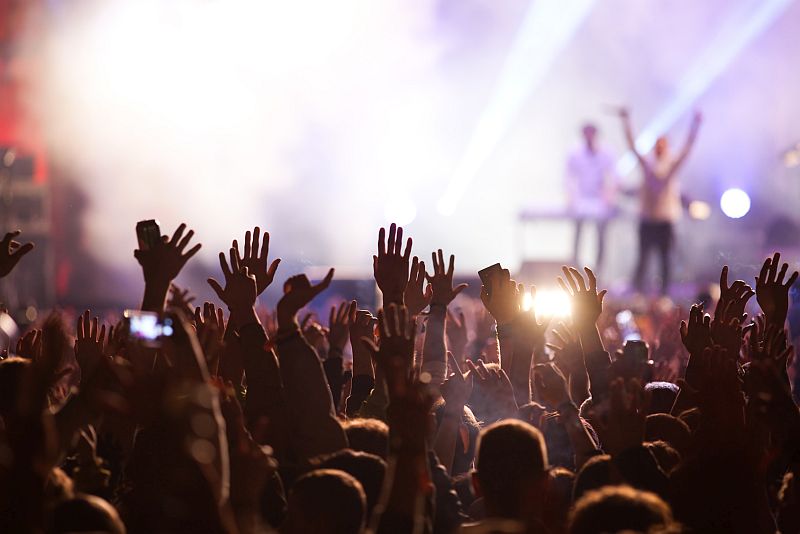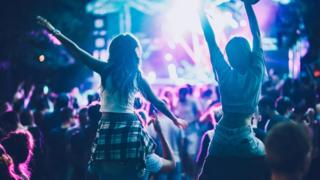High-Intensity Strobe Lights : Seizures
"EDM [electronic dance music] concerts almost always use stroboscopic light effects. This study strongly suggests that such light effects markedly enhance the risk of epileptic seizures among visitors."
"Stroboscopic light effects are prime suspects, but probably not solely responsible [for the increased risk]."
"Regardless of whether stroboscopic lights are solely responsible or whether sleep deprivation and/or substance abuse also play a role, the appropriate interpretation is that large [electronic dance music] festivals, especially during the night-time, probably cause at least a number of people per event to suffer epileptic seizures."
Dutch study team, BMJ Open
"We expected somewhat more [seizures at night] than during the day, but not as much, maybe not three-and-a-half times more."
"If a person has no predisposition for epilepsy, then factors like strobe lighting will not have any effect. However, most people are unaware of this predisposition they might have: more than a couple of cases explicitly reported this to be the first time they experienced an epileptic fit."
Newel Salet, VU Medical Center, Amsterdam
"If the lighting environment suddenly changes, someone may not have much time to reposition themselves if they are vulnerable."
"Nothing is completely reliable, but being aware of the potential for a problem, thinking ahead, and having a plan in place to reduce risk is important."
Dr. David Burkholder, neurologist, Mayo Clinic, Rochester, Minnesota
 |
| HealthDay |
Dr. Salet and his colleagues at the VU Medical Center analyzed data for over 400,000 people who attended 28 electronic dance music concerts in 2015 in the Netherlands. Indoor or nighttime events accounted for 60 percent of the concerts studied. Medical assistance was available and ultimately provided to concert-goers on more than 2,700 occasions during the concerts. At concerts that took place during the night, thirty epileptic seizure cases were identified.
This, in contrast with nine occasions of epileptic seizures taking place during events taking place during the day. According to Dr. Salet it's possible the differential could be related to the light effects, their greater intensity in a dark environment comparable to well-lit daytime environments. The study assessed recreational drug use with a focus on drugs such as ecstasy, with known association to increased seizure risk. Unexpectedly, the proportion of seizure cases where drug was in use showed no difference between daytime or nighttime concerts.
The research was spurred by the knowledge that many young people who flock to electronic dance music festivals, popular for high decibel sound and intense stroboscopic light beams, may not be aware whether they have a vulnerability to epileptic seizures. It is well understood that epileptic seizures can be triggered by bright light, and the study was meant to alert the public that these lights could be placing festival attendees at risk of injuries, hospitalization, and other complications that could result from light-provoked seizures.
People with photo sensitive epilepsy are susceptible to electrical disturbances in the brain, resulting from exposure to flickering or flashing lights and patterns. Lights strobing in the frequency range of 15 to 25 hertz or cycles per second have been recognized for their potential to provoke seizures in vulnerable people.
What inspired Dr. Salet to undertake the research was his experience in treating a 20-year-old man absent a history of epilepsy, brought to the emergency department of his hospital because he had attended a nighttime dance party and had suffered a seizure. This led the doctor and his colleagues to speculate whether such events occur more frequently than is known.
Electronic dance music festival organizers are advised that visitors to their events should be made aware that a risk of seizures is a possibility in situations where strobe lights are a feature -- including at video game and movie events using intense light effects, recommends Dr. Ignacio Valencia of the Drexel University College of Medicine in Philadelphia.
Dr. Salet is concerned that avoidance of these events would benefit people with a history of photosensitive epilepsy. At the very least they should be informed along with others accompanying them to such events of the potential of seizures occurring very quickly. Those intending to visit such concerts should never be sleep deprived, should avoid alcohol and other recreation drugs.
Further advice resulting from the study conclusions is that people known to be trigger-vulnerable to such seizures should take care to stand back and away from the stage. And should they experience symptoms leading them to believe a seizure may be imminent, they should swiftly move themselves to a location further from the lights.
"The festival season has become something of a rite of passage. We would encourage festival organisers to at least warn visitors that they are using strobe lighting so that festival-goers can decide whether it will be safe for them to attend before buying their tickets."
"But it would be really life-affirming, in these days when we aspire to inclusivity, if organisers could do the responsible thing and keep the strobe lighting at a rate that should not pose a risk."
"The festival season is all about having a good time, but that should include everyone together, in a safe and supportive environment."
Clare Pelham, chief executive, Epilepsy Society
 |
| Strobe lighting at music festivals can increase the risk of epileptic seizures, researchers have warned. Getty Images |
Labels: Epilepsy, Health, Lights, Music Festivals, Seizures

0 Comments:
Post a Comment
<< Home